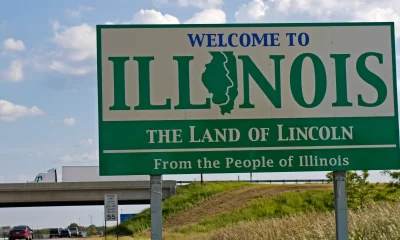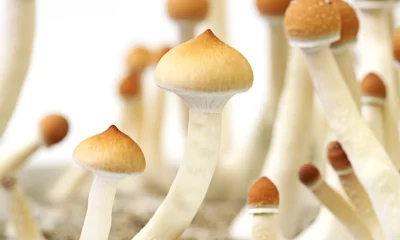News
NFL Star Aaron Rodgers Used Ayahuasca Before Dual MVP Seasons

Green Bay Packers star quarterback Aaron Rodgers revealed on a podcast that he took ayahuasca before winning back-to-back MVP awards, crediting the psychedelic brew with giving him the mindset to play two of the best seasons of his career.
NFL star quarterback Aaron Rodgers revealed this week that he traveled to South America to take ayahuasca before being selected as the league’s most valuable player two seasons in a row, saying the potent psychedelic concoction changed his mindset and markedly improved his mental health. Rodgers made the revelations about his experiences with ayahuasca during an appearance on the Aubrey Marcus Podcast, where he shared that the psychedelic drug helped him find self-love and mental wellness.
The Green Bay Packers’ Superbowl champion quarterback said that he made the trip to South America prior to winning the MVP award for the third and fourth time in 2020 and 2021. Following the ayahuasca experience, he said, he “knew that [he] was never going to be the same.”
“For me, I didn’t do that and think ‘oh, I’m never playing football again,’” Rodgers said, as quoted by USA Today. “No, it gave me a deep and meaningful appreciation for life. My intention the first night going in was ‘I want to feel what pure love feels like.’ That was my intention. And I did. I really did. I had a magical experience with the sensation of feeling a hundred different hands on my body imparting a blessing of love and forgiveness for myself and gratitude for this life from what seemed to be my ancestors.”
Ayahuasca is a psychoactive brew of leaves and vines that is used by indigenous groups in South America’s Amazon basin for social and shamanic ceremonies. It contains the potent psychedelic drug dimethyltryptamine (DMT), which can cause intense vivid sensations and hallucinations. Dr. Robin Carhart-Harris, head of the Centre for Psychedelic Research at Imperial College London, led a study on ayahuasca published in 2019 that found the brew caused a change to waking brainwaves the researchers compared to “dreaming while awake.”
“DMT is a particularly intriguing psychedelic. The visual vividness and depth of immersion produced by high-doses of the substance seems to be on a scale above what is reported with more widely studied psychedelics such as psilocybin or ‘magic mushrooms’,” Carhart-Harris explained. “It’s hard to capture and communicate what it is like for people experiencing DMT but likening it to dreaming while awake or a near-death experience is useful. Our sense is that research with DMT may yield important insights into the relationship between brain activity and consciousness, and this small study is a first step along that road.”
Ayahuasca Led to Best Season of Rodgers’ Career
During the podcast interview with Marcus, Rodgers said that his experience with ayahuasca “set me on my course to be able to go back in to my job and have a different perspective on things. To be way more free at work, as a leader, as a teammate, as a friend, as a lover. I really feel like that experience paved the way for me to have the best season of my career (in 2020).”
He added that the psychedelic drug helped him reframe his mindset, leading to improvements in mental health that helped him to play two of the best seasons of his career, winning his third and fourth MVP awards in 2020 and 2021.
“I don’t think it’s a coincidence,” Rodgers said about the ayahuasca experience in South America. “I really don’t. I don’t really believe in coincidences at this point. It’s the universe bringing things to happen when they’re supposed to happen.”
“There’s signs and synchronicities all around us at all times if we’re awake enough to see them and to take them in and to listen to our intuition when it’s speaking to us or pounding us in the head saying, ‘Hey dummy, this is what you’re supposed to be doing,’” he continued.
Rodgers said that he was inspired to try ayahuasca after a previous experience with psychedelic drugs. Marcus added that the NFL star had once told him that “one of the best days of my life” featured taking psychedelic mushrooms on a beach where he said he “felt [him]self merge with the ocean.”
The NFL star added that many people focus on the negative side effects of ayahuasca, which can include vomiting, diarrhea, and uncomfortable hallucinations, rather than the “deep and meaningful and crazy mind-expanding possibilities and also deep self-love and healing that can happen on the other side” that the drug can induce.
That self-love, Rodgers said, was a key benefit of his mental health journey.
“To me, one of the core tenets of your mental health is that self-love,” Rodgers said. “That’s what ayahuasca did for me, was help me see how to unconditionally love myself. It’s only in that unconditional self love, that then I’m able to truly be able to unconditionally love others. And what better way to work on my mental health than to have an experience like that?”
Source: https://hightimes.com/news/nfl-star-aaron-rodgers-used-ayahuasca-before-dual-mvp-seasons/
Business
New Mexico cannabis operator fined, loses license for alleged BioTrack fraud

New Mexico regulators fined a cannabis operator nearly $300,000 and revoked its license after the company allegedly created fake reports in the state’s traceability software.
The New Mexico Cannabis Control Division (CCD) accused marijuana manufacturer and retailer Golden Roots of 11 violations, according to Albuquerque Business First.
Golden Roots operates the The Cannabis Revolution Dispensary.
The majority of the violations are related to the Albuquerque company’s improper use of BioTrack, which has been New Mexico’s track-and-trace vendor since 2015.
The CCD alleges Golden Roots reported marijuana production only two months after it had received its vertically integrated license, according to Albuquerque Business First.
Because cannabis takes longer than two months to be cultivated, the CCD was suspicious of the report.
After inspecting the company’s premises, the CCD alleged Golden Roots reported cultivation, transportation and sales in BioTrack but wasn’t able to provide officers who inspected the site evidence that the operator was cultivating cannabis.
In April, the CCD revoked Golden Roots’ license and issued a $10,000 fine, according to the news outlet.
The company requested a hearing, which the regulator scheduled for Sept. 1.
At the hearing, the CCD testified that the company’s dried-cannabis weights in BioTrack were suspicious because they didn’t seem to accurately reflect how much weight marijuana loses as it dries.
Company employees also poorly accounted for why they were making adjustments in the system of up to 24 pounds of cannabis, making comments such as “bad” or “mistake” in the software, Albuquerque Business First reported.
Golden Roots was fined $298,972.05 – the amount regulators allege the company made selling products that weren’t properly accounted for in BioTrack.
The CCD has been cracking down on cannabis operators accused of selling products procured from out-of-state or not grown legally:
- Regulators alleged in August that Albuquerque dispensary Sawmill Sweet Leaf sold out-of-state products and didn’t have a license for extraction.
- Paradise Exotics Distro lost its license in July after regulators alleged the company sold products made in California.
Golden Roots was the first alleged rulebreaker in New Mexico to be asked to pay a large fine.
Source: https://mjbizdaily.com/new-mexico-cannabis-operator-fined-loses-license-for-alleged-biotrack-fraud/
Business
Marijuana companies suing US attorney general in federal prohibition challenge

Four marijuana companies, including a multistate operator, have filed a lawsuit against U.S. Attorney General Merrick Garland in which they allege the federal MJ prohibition under the Controlled Substances Act is no longer constitutional.
According to the complaint, filed Thursday in U.S. District Court in Massachusetts, retailer Canna Provisions, Treevit delivery service CEO Gyasi Sellers, cultivator Wiseacre Farm and MSO Verano Holdings Corp. are all harmed by “the federal government’s unconstitutional ban on cultivating, manufacturing, distributing, or possessing intrastate marijuana.”
Verano is headquartered in Chicago but has operations in Massachusetts; the other three operators are based in Massachusetts.
The lawsuit seeks a ruling that the “Controlled Substances Act is unconstitutional as applied to the intrastate cultivation, manufacture, possession, and distribution of marijuana pursuant to state law.”
The companies want the case to go before the U.S. Supreme Court.
They hired prominent law firm Boies Schiller Flexner to represent them.
The New York-based firm’s principal is David Boies, whose former clients include Microsoft, former presidential candidate Al Gore and Elizabeth Holmes’ disgraced startup Theranos.
Similar challenges to the federal Controlled Substances Act (CSA) have failed.
One such challenge led to a landmark Supreme Court decision in 2005.
In Gonzalez vs. Raich, the highest court in the United States ruled in a 6-3 decision that the commerce clause of the U.S. Constitution gave Congress the power to outlaw marijuana federally, even though state laws allow the cultivation and sale of cannabis.
In the 18 years since that ruling, 23 states and the District of Columbia have legalized adult-use marijuana and the federal government has allowed a multibillion-dollar cannabis industry to thrive.
Since both Congress and the U.S. Department of Justice, currently headed by Garland, have declined to intervene in state-licensed marijuana markets, the key facts that led to the Supreme Court’s 2005 ruling “no longer apply,” Boies said in a statement Thursday.
“The Supreme Court has since made clear that the federal government lacks the authority to regulate purely intrastate commerce,” Boies said.
“Moreover, the facts on which those precedents are based are no longer true.”
Verano President Darren Weiss said in a statement the company is “prepared to bring this case all the way to the Supreme Court in order to align federal law with how Congress has acted for years.”
While the Biden administration’s push to reschedule marijuana would help solve marijuana operators’ federal tax woes, neither rescheduling nor modest Congressional reforms such as the SAFER Banking Act “solve the fundamental issue,” Weiss added.
“The application of the CSA to lawful state-run cannabis business is an unconstitutional overreach on state sovereignty that has led to decades of harm, failed businesses, lost jobs, and unsafe working conditions.”
Business
Alabama to make another attempt Dec. 1 to award medical cannabis licenses

Alabama regulators are targeting Dec. 1 to award the first batch of medical cannabis business licenses after the agency’s first two attempts were scrapped because of scoring errors and litigation.
The first licenses will be awarded to individual cultivators, delivery providers, processors, dispensaries and state testing labs, according to the Alabama Medical Cannabis Commission (AMCC).
Then, on Dec. 12, the AMCC will award licenses for vertically integrated operations, a designation set primarily for multistate operators.
Licenses are expected to be handed out 28 days after they have been awarded, so MMJ production could begin in early January, according to the Alabama Daily News.
That means MMJ products could be available for patients around early March, an AMCC spokesperson told the media outlet.
Regulators initially awarded 21 business licenses in June, only to void them after applicants alleged inconsistencies with how the applications were scored.
Then, in August, the state awarded 24 different licenses – 19 went to June recipients – only to reverse themselves again and scratch those licenses after spurned applicants filed lawsuits.
A state judge dismissed a lawsuit filed by Chicago-based MSO Verano Holdings Corp., but another lawsuit is pending.
Source: https://mjbizdaily.com/alabama-plans-to-award-medical-cannabis-licenses-dec-1/
-

 Business2 years ago
Business2 years agoPot Odor Does Not Justify Probable Cause for Vehicle Searches, Minnesota Court Affirms
-

 Business2 years ago
Business2 years agoNew Mexico cannabis operator fined, loses license for alleged BioTrack fraud
-

 Business2 years ago
Business2 years agoAlabama to make another attempt Dec. 1 to award medical cannabis licenses
-

 Business2 years ago
Business2 years agoWashington State Pays Out $9.4 Million in Refunds Relating to Drug Convictions
-

 Business2 years ago
Business2 years agoMarijuana companies suing US attorney general in federal prohibition challenge
-

 Business2 years ago
Business2 years agoLegal Marijuana Handed A Nothing Burger From NY State
-

 Business2 years ago
Business2 years agoCan Cannabis Help Seasonal Depression
-

 Blogs2 years ago
Blogs2 years agoCannabis Art Is Flourishing On Etsy













